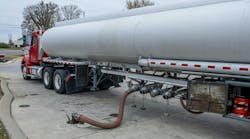By mid-April, Americans had much to be thankful for regarding Iraq. Our lightning victory had been achieved with minimal U.S. casualties and few repercussions elsewhere: no upsurge of anti-American activity in other countries, no terrorist acts in the U.S., almost no destruction of Iraqi oil fields. Yet there may be repercussions for highway spending and taxes.
Diesel prices, which soared to a national average of $1.77 on March 10, a week before the war started, plunged a record 22¢ in the following four weeks, according to the Energy Information Administration's weekly survey. (Belying the notion that fuel prices fall more slowly than they rise, the four-week drop was double the 11¢ climb in the previous four weeks.)
The International Energy Agency reported that worldwide crude oil production was at an all-time high. The closing price for crude oil fell roughly $10 per barrel, the equivalent of 24c/gal., and threatened to go much lower. Gasoline prices did a similar but smaller turnabout from the record of $1.766 set on March 17.
This drop may be just the opening Congress needs to adopt fuel tax indexing to adjust tax rates for inflation, a step 11 states already take. The current law determining how highway and transit funds are apportioned, nicknamed TEA-21, expires September 30. To get enough votes to pass a replacement bill, the transportation committees want to expand outlays but need to find a revenue source that's not an explicit tax increase, which would be certain veto bait. Indexing might help fill the bill — and the till.
When pump prices — and inflation — were peaking, there was no chance Congress would have voted to throw fuel on the fire by indexing the tax rates. But if inflation settles back to 2%-2.5%, as most economists expect, indexing would translate into only a 0.5¢/gal. annual rise in gasoline and diesel prices, less than the typical weekly fluctuation at the pump.
The House Republican leadership and the Bush Administration had both been adamant earlier in the year against indexing, as well as explicitly increasing taxes. But the House, at least, may now change.
The economy might offer a further rationale for indexing. If growth remains sluggish, there will be arguments made for increasing highway spending to provide construction and manufacturing jobs. But with estimates of the deficit heading into the stratosphere, along with demands for postwar funds for Iraq, airlines, defense restocking and domestic security, there is no prospect of funding more highway spending without new revenues.
Indexing is not the only possibility. The Senate Finance Committee has already approved, as part of an energy bill, two other ways of bringing more revenue into the Highway Trust Fund. It voted to raise the tax rate on gasohol to the same level as gasoline, with all proceeds going to the trust fund. Currently, gasohol receives a 5.2¢ subsidy, and an additional 2.5¢/gal. is retained in the general fund. Gasohol blenders would receive the same subsidy as under current law but it would be paid by the general fund, not the trust fund.
In addition, the committee voted to change reporting requirements for sales of untaxed aviation kerosene to make it harder to divert that fuel into trucks. Nevertheless, the transportation committees are likely to seek enough highway and transit spending that indexing will be needed on top of these two changes.
The bottom line: You may be celebrating the retreat of high diesel prices along with the victory in Iraq. But be aware the retreat may provide as good an occasion as Congress can find for indexing fuel taxes.


